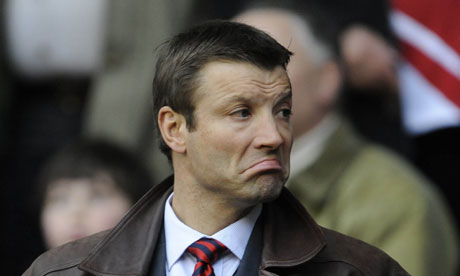
The Rugby Football Union, reeling after the worst week in their 140-year history, risk fuelling further public outrage by considering bonus payments to their salaried staff, including the acting chief executive, Martyn Thomas, and the director of elite rugby, Rob Andrew.
Thomas is severing his ties with Twickenham next month, having been criticised in an official report, and Andrew has come under severe pressure to resign after a wave of critical revelations about England's World Cup campaign. One suggestion from a former RFU employee is that the chief executive's bonus could be worth £250,000, given this year's financial results.
The prospect of anyone at Twickenham receiving financial rewards after a year of almost perpetual firefighting will put the stricken governing body under even more pressure, even though the RFU – a couple of days before Andrew said the union had reached "rock bottom" after three reviews into what happened on and off the field in New Zealand were leaked – announced a record profit of £8.7m.
It is customary for the RFU to reward their seven executive directors with bonuses if financial targets are met, the chief executive traditionally getting the biggest handout. Two years ago, some of the union's council members protested when it was announced that bonuses would be given to executive directors even though there was a pay freeze at Twickenham and job losses.
The decision about bonus payments for executive directors is made by the RFU's remuneration panel, a body made up of three nonexecutive members of the board of directors that meets three times a year and has the power to co-opt independents. It is chaired by Peter Baines who, when asked by the Observer whether bonuses would be paid this year and if Thomas would be among those who received them, replied: "No comment." When pressed, he referred the matter to the governing body's communications department.
Thomas did not return a telephone call on Friday morning. By the afternoon, he had changed his voicemail message, referring media callers to the communications department. Neither he nor Baines responded to emails, and an RFU spokesman said: "This is a matter for the remuneration panel and it is not something will be commenting on."
One member of the council said that there would be repercussions if Thomas received a bonus before he clears his desk on 16 December. Thomas was so heavily criticised in a report by a panel chaired by the RFU's chief disciplinary officer, Jeff Blackett, in July – set up to look into the hiring and firing of John Steele as chief executive – that the council was recommended to remove him from all his positions at Twickenham; advice that was ignored.
The council member said: "Council members have this year twice failed to take the appropriate action but the board would find itself drowned by a tidal wave of protests if bonus payments were made. Never mind the financial results, we have had a year when we have failed lamentably as an administration. If anyone were seen to be rewarded after that, it would not just heap more ridicule and contempt upon us but it would further alienate the rugby public at a time when we need to show them that we are sorting ourselves out. It would make us even more unpopular than bankers."
The remuneration panel is responsible for advising the RFU's board of directors on the pay and terms and conditions of the chief executive and the executive directors. In the year ending last June, its members were Baines, Thomas (who stood down when he resigned as chairman of the board and became acting chief executive), John Douglas, Graham Thompson and the Warwickshire County Cricket club chief executive, Colin Povey.
The RFU have two key meetings. The first is on Wednesday when the board will consider a report from the professional game board about England's dire World Cup campaign and consider a shortlist for a new head coach and management team. On Friday, the council will discuss an investigation by the legal firm Slaughter and May into the governance of the union.
With little more than two months before the start of the Six Nations, and five weeks before England have to name their 32-strong elite squad, Andrew conceded that the RFU may have to appoint an interim coaching team to give it time to appoint a successor to Martin Johnson, who resigned as team manager on 16 November.
"English rugby is damaged and it has been like that on and off the field for the last 12 months," Andrew said. "There has been no shortage of interest in the England job and we have a very long list of candidates. We have to take our time and get the appointment right. We are prepared to have an interim coach to succeed Martin. The board will look at that on Wednesday when the plans for the recruitment of the head coach will be set out. We are looking for the very best man who can take England forward."

